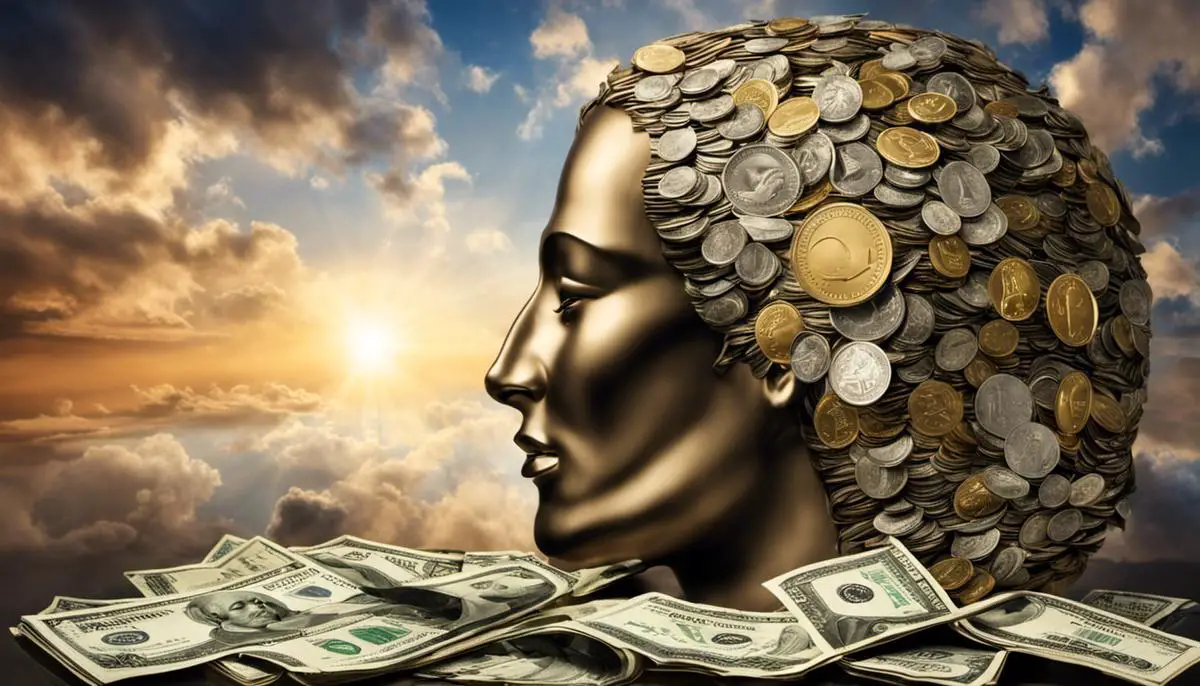Across cultures and civilizations, dreams have always served as a fascinating subject that encapsulates the mysteries of the human mind. Their elusive nature, shrouded in symbolism, has prompted interpretations perceived through various lenses – historic, psychological, cultural, and societal. One such replete symbol that has intrigued scholars over centuries is that of burning money. Digging deep into the subconscious, this symbol represents a rich tapestry of thoughts, emotions, and possibilities that could be tied to our personal lives and societal dynamics. This exploration begins with a historical overview of dream interpretations, then ventures into the realm of psychological theories from influential figures such as Freud and Jung, through modern cognitive neuroscience. Comparisons are drawn from cultural interpretations worldwide – from Eastern philosophies to African tribes to European folklore, and the Native American traditions, shedding light on how diverse our perceptions can be.
Historical Interpretation of Dreams
The Historical Evolution of Dream Interpretive Paradigms: An Examination of the Symbolism of Burning Money
Understanding the intricacies and elusive nuances of dream interpretation can be a compelling endeavor. Since time immemorial, humanity has sought to derive meaning from the seemingly arbitrary events and symbols that occur within our subconscious. Dream interpretation has undergone significant transformation throughout history and incorporated myriad elements, one of which is the symbolism of burning money conspicuously present in numerous cultures.
Historically, dreams have been perceived through a variety of interpretive lenses across different cultures and eras. In Ancient Egypt, dreams were considered divine messages and a reference point for predicting future events. Early Christian theology, particularly with the likes of St. Augustine, also imbued dreams with spiritual significance.
However, the Modern era heralded a sharp paradigm shift with the advent of psychoanalysis. The interpretive approach of Sigmund Freud held dreams as symbolic representations of repressed desires, while his contemporary Carl Jung proposed a Collective Unconsciousness theory. The integration of psychological insights into dream interpretation brought a deeper, more nuanced understanding of personal symbolism and individual subconscious processes, an essential step forward in dream interpretation paradigms.
Steering the discourse towards the peculiar symbolism of burning money, essentially, monetary symbols in dreams often represent power, value, and worth. Unlike static symbols, burning money bears a dynamic facet, signifying a transformation, a change in perceived value, or a releasing process. Burning can denote purification, transformative processes, or destructive tendencies, depending upon the cultural and individual perspective.
In Taoist ritualistic traditions, ‘Joss Paper’ or ‘Ghost Money,’ counterfeit banknotes or paper-crafted wealth assets are burned, signaling the transfer of wealth to deceased ancestors in the afterlife. This practice subtly underlines the East Asian philosophy of the life-death continuum and ancestor reverence.
For Western societies that uphold the principle of economic materialism, dreaming of burning money may symbolize anxiety about losses, the fear of instability, or even reflect a subconscious desire to liberate oneself from the cycles of materialistic pursuits.
The fascinating exploration of dream interpretation and symbolism of burning money distinctly identifies that cultural, societal, and personal contexts are pivotal in deriving meaning from dreams. Modes of dream interpretations have decidedly evolved from divinity-centric to comprehensive psychological paradigms. Concurrently, the symbolism of burning money insinuates elements that are intrinsically related to culture and personal beliefs. An interdisciplinary approach incorporating history, anthropology, psychology, and cultural studies offers great promise in elucidating the rich tapestry of dream interpretation in future pursuits.

Psychology and Dreams
Unveiling the Unconscious: The Intersection of Dream Interpretation and Psychology Through the Lens of the Burning Money Symbol
Dive into the labyrinth of dream interpretation – an intellectual exercise that has seen centuries of discourse – and you’ll find it intertwined with the human psychological landscape. In contemporary psychology, the symbolism of dreams takes center focus. Particularly intriguing is the image of burning money, a quintessential symbol charged with concealed meanings and complex layers of understanding.
Freudian and Jungian interpretations – the stalwarts of dream analysis – view dream symbols as representations, not just of repressed desires, but also of a collective unconsciousness. The symbol of burning money, thus, presents a nuanced understanding of the human mind and emotions.
The conceptualization of burning money likely elicits a strong emotional response. It is frequently linked to notions of power, worth, and value, and depending on context, it can signify starkly contrasting possibilities – transformation and change in perceived value or a harbinger of fear, anxiety, and uncertainty arising from materialistic pursuits in Western societies.
Interestingly, turning to Eastern traditions like the Taoist ritualistic customs, the act of burning “Joss Paper” or “Ghost Money” profoundly embodies transformation, an offering to appease and communicate with the ancestors.
With discontinuity in symbolism across cultures, personalized interpretational contexts emerge as indispensable. This stresses the importance of acknowledging the cultural, societal, and personal contexts in dream interpretation, making it a truly interdisciplinary study unifying history, anthropology, psychology, and cultural studies.
The evolution of dream interpretation from divine-centric ancient Egyptian and early Christian theologies to the modern-day psychological perspective has broadened the understanding of human psyche. The cross-pollination of diverse disciplinary insights fosters a more holistic and nuanced understanding of the dream phenomenon.
While burning money serves as an illuminating case study, the grander narrative rests in connecting dream interpretation and psychology. This connection unveils a voyage into the unconscious psyche, where the mind weaves intricate narratives drawn from the depths of personal experiences and cultural ramifications. Unraveling the symbolism housed in this unconscious repository promises an enhanced understanding of human emotions, behavioral tendencies, and mental health.
In conclusion, the intersecting fields of dream interpretation and psychology provide a compelling framework, uncovering a psychointellectual panorama often embodied in symbols like burning money. A comprehension of such symbols augments the understanding of the human psyche, paving the path towards exploring multidimensional mental landscapes, potentially transforming psychological research and practice. This integral intersection of fields affirms the credibility and relevance of dream interpretation within contemporary psychology.

Cultural Interpretations
In continuing this exploration of dream interpretation and the potent symbolism of burning money, let us now turn to some other cultural lenses. From Freud’s psychoanalytical interpretation and Jung’s concept of the collective unconsciousness, the field now recognizes the importance of sociocultural contexts to add another vital layer of meaning.
A pertinent example is found in the indigenous societies of the Americas. Here, dreams serve as influential conduits for communication with the spiritual realm. In this framework, burning money might be perceived not principally as a symbol associated with worldly wealth or material value, but rather as a conduit for spiritual cleaning, a purifying force driving out negative energies and ushering in prosperity from the spirit world.
Switching geographical focus to Sub-Saharan Africa, various tribal cultures, such as the Zulu, consider dreams to be a realm where ancestral spirits communicate critical messages. The act of burning money in dreams can symbolize a call for sacrificial offerings or ancestral appeasement. The interpretation is, therefore, not solely reliant on the symbolism of money, but also the cultural context in which the dreamer exists.
These examples are not to understate the importance of individual context. Two persons from the same culture could interpret the act of burning money in dreams quite differently, dependent on their personal experiences. For instance, among individuals heavily involved in financial markets, the act of burning money could elicit feelings of market volatility or impending financial crisis. Conversely, for individuals embracing minimalistic lifestyles, the same symbol could imply liberation from materialistic constraints or a radical shift in value systems.
One less explored field, the movement of neurocognitive dream theory, posits dreams as simply the byproduct of our sleeping brain’s processes, rather than a rich tapestry of symbolism. From this perspective, the act of burning money could be tied to recent experiences related to financial transactions, money discussions, or concerns about financial stability.
The breadth and diversity of interpretations elucidate the vibrant richness of dream interpretation as a true interdisciplinary endeavor. Historical contexts, anthropological insight, psychological theories, and cultural studies all contribute vital components to this complex mosaic of symbology.
To conclude, understanding dreams, particularly those involving potent symbols such as burning money, demand attention to a wide spectrum of factors. While the exploration of various theoretical underpinnings offers deeper insights, each interpretation remains tethered to the dreamer’s personal experiences and cultural milieu. Recognizing these diverse lenses can contribute to a more eclectic and empathetic grasp of the complex realm of dreams, ultimately fostering a more comprehensive understanding of the human psyche.

Societal and Personal Implications
Transitioning to the societal implications of dreams, one must note that societal reactions to the act of dreaming, and more specifically the act of burning money in dreams, can vary widely. In societies where money is highly valued as a primary resource for survival and growth, such dreams can be considered taboo or even condemnatory. Conversely, societies that prioritize communal living and shared resources might react with indifference or neutrality to such dreams.
Focusing specifically on dreams of burning money, common societal implications might range from being seen as wasteful and irresponsible, to a rebellion against materialistic ideologies ingrained in the society. Such dreams could, in some cases, signify a collective societal struggle against excessive consumerism, acting as a wake-up call for the society to reassess its current values and potentially pivot towards more sustainable or holistic lifestyles.
In terms of personal implications, dreams of burning money could be profoundly introspective, potentially serving as a mirror reflecting deeply rooted personal anxieties or fears related to financial security, power, or societal status. Such dreams could trigger introspection and self-questioning, prompting the individual to re-evaluate their current relationship with money and economic success.
Interpreting these implications necessitates careful navigation. At the societal level, it requires balanced critique and open dialogues about shared values and aspirations. It calls for collective engagement in re-evaluating current societal priorities and includes the fostering of conscious cultures that promote balanced lifestyles.
On the personal level, navigation might involve seeking professional help such as psychoanalysis or counseling to delve into the subconscious emotions that spur dreams of burning money. It could also be complemented by practices like journaling or meditation to encourage increased self-awareness and understanding.
However, caution must be exercised to avoid generalized interpretations as dreams are a highly subjective phenomenon, and vary greatly across individuals and cultures. It is paramount to consider the unique complexities of each situation, taking into account factors such as personal history, societal context, and cultural background. Striking a balance between societal and personal implications might provide the most beneficial insight. The innate ambiguity and subjective realm of dreams indeed forms one of its most fascinating aspects, adding depth to the continuous exploration of human psyche and consciousness.
While contentious debates abound regarding the pragmatism and subjective nature of dream interpretation, clear societal and personal implications cannot be denied. These dreams act as profound introspective devices, catalyzing societal dialogues, self-reflection, and change. Learning to navigate these implications can lead to personal growth, collective societal evolution, and deeper appreciation for the complexity and depth of human consciousness. The continued study of dreams, and more specifically the symbolism of burning money in dreams, bolsters the inexhaustible realm of psyche exploration, unraveling insights into not just individual minds, but also societies at large – a testament to the intricate link between individuals and the societies to which they belong.

Interpreting dreams, especially those revolving around money burning, is not merely an exercise in curiosity, but a profound quest to understand the complexities of the human psyche, cultural norms, and societal trends. This reveals that the essence of such a dream may sometimes be a reflection of one’s fears, desires, or anxieties tied to financial security, societal expectations, or individual ambitions. Yet, it lies amidst a continuum, altered by cultural attitudes and personal significances. The interpretation of burning money in dreams is neither uniform nor simple. It represents a conjunction where human psychology, societal constructs, personal experiences, and culture intersect and influence each other. Thus, the burning money in your dream could mean something incredibly personal and unique to you, but it’s worth exploring these broader avenues to find resonance or even simple understanding.
